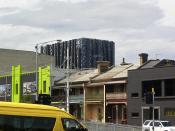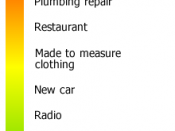Economics Essay
Everyone has needs and wants, needs are limited and wants are not. each country has resources that enable its people to get both what they need and want, but these resources will run out so everyone cant have everything they want, this is called relative scarcity and is a problem in economic systems throughout the world.
Every time we decide on a good or service, there is something else we cant have. this is opportunistic cost and it is also a problem as the economy attempts to prioritise everyone's needs and ever changing wants.
Every society has three basic economic questions that they must address; what goods and services will be produced? How and how much are going to be produced? And who will be the consumers of these goods and services?
Different economies have evolved to address this problem, we will be looking at, traditional/barter, command/planned, free enterprise and Australia's economy.
We will be looking at how they deal with the three economic questions, addressing their characteristics, advantages and disadvantages.
The barter system is based on customs and traditions, though is not as common in today's world. goods are directly exchanged for other goods and wants without the use of a common exchange unit such as money.
For example
If I were a cattle farmer under the influence of the barter system, and I wanted/needed vegetables I would have to trade one of my cattle for, for example a lettuce, but how many lettuces would I get for one cattle? Surely one of my cattle isn't worth one lettuce, so there is the danger of nonequivalent exchange. In this economy, there is less of a demand for goods as they will only be produced if they are going to be consumed.
Characteristics of this economy are that...


